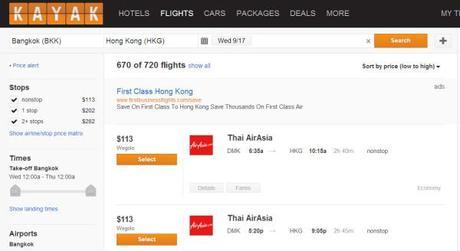
I meant to go here
Is it possible to get nothing for something and still think you’ve gotten a good deal? Apparently, the answer to that question is yes. Or at least that’s my conclusion after reading an unintentionally hilarious report about how one last minute traveler “scored a good-value award on Cathay Pacific” Airlines.
The short version of this story is that a traveler hadn’t researched or booked parts of his itinerary and, as a result, was having difficulty piecing together some needed flights. Unfortunately, the only flight that fit his needs “was pricing out at a whopping $678, even for economy! That was way too much money for me to shell out,” he writes.
After working some travel hacking magic, the hero of this story manages to book that same flight for $111 plus 2,500 Avios points. Triumphantly he exclaims that the $567 he saved in airfare got him a redemption value on his frequent flyer miles of “a whopping 22.7 cents per point!”
And it’s true. After putting himself in a bind by not booking his flight ahead, he was able to partially avoid a steep penalty by using frequent flyer points.
But here’s the thing: he could have booked an identical flight in advance for $113. So instead of saving $567 he really spent 2,500 Avios points to purchase a ticket for $111 that he otherwise could have bought for $113. That $2 in savings works out to an abysmal .08 cents per point!

So here we have the same exact set of facts with two wildly different opinions about something that should be pretty clear cut. Were his points worth a “whopping 22.7 cents” each or practically worthless at .08 cents each? To me the answer is clear. He spent more for the flight than he needed to. And he’s delighted.
How can that be?
I think the simple answer is that if you haven’t researched flights in advance, you don’t really have a sense of how much you’re overpaying. So when you choose the least bad option remaining, you can console yourself with the fact that you did the best you could. Only you didn’t. Not really.
We saw the same thing when we reviewed the last-minute booking app Hotel Tonight. It’s a program that really should deliver great deals for travelers. But in our experiments we were always able to find better places at cheaper rates by reserving ahead.
We still had people tell us what great discounts they got booking last minute with the app. The only problem is that in every case we could verify those last minute discounts were smaller than the ones offered for advance bookings. So yeah, they saved money off some inflated list price. But they still paid more than they could have. And they were thrilled.
That same phenomenon seems to apply to the broader topic of travel planning. If you read as many travel articles as I do, it’s hard not to get the impression that the best way to travel is to hop on a plane with no plans and just let the world shower you with unforgettable experiences.
If you think I’m kidding, here is a small sample of articles from well-respected travel sources basically recommending that approach:
How to travel without a plan
6 reasons to travel without a plan
Why travel planning can be dangerous
Showing up in a foreign city with no place to stay
I never really understood the appeal of this style of travel. Sure, if you’re by yourself it’s great to have the option of setting off in an unexpected direction with cool people you just met (especially if you’re both single and they’re exceptionally hot). But that seems more like a special case than a general rule. Most adults don’t travel alone, except on business. I know we never do.
Without that benefit the rest of us are left to consider all the costs of traveling without a plan. Things like paying a premium for last minute fares; missing opportunities because they’re fully booked; having to backtrack because transportation doesn’t go where you want it to go; and generally expending extra time and energy cobbling together second or third best options are all avoidable hassles. Where’s the upside?
Is that flexibility really worth 22.7 cents per point?
We’re told that travel flexibility pays for it all. Once you’re out on the road, you’ll discover opportunities you haven’t considered and be glad you never settled on a specific path. But how valuable is this vaunted flexibility, really? Is it worth 22.7 cents per point or just .08?
If you haven’t researched your options in advance, how can you possibly know? That tip from a bartender sounds like a great discovery. Suddenly you’re off on a new direction going to a town you hadn’t previously known about. You’re delighted with your open itinerary because that enables you to follow this great local lead.
Meanwhile, we’re sitting across the bar overhearing the conversation. Our reaction is a bit different. We remember reading about this place before. In fact, it’s listed as the 27th thing to do on TripAdvisor. We know it’s an assache to get to and harder to get away from. We had already considered going but decided our next destination suited our interests better.
So instead of scrambling to figure out logistics for getting to this other town, we order another round. After all, we have plenty of time. Our train doesn’t leave for another hour and we have lodging waiting for us when we arrive.

